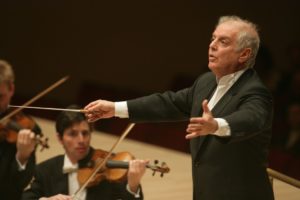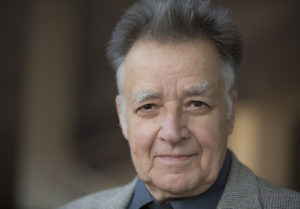My plans for September in Berlin were changing like a kaleidoscope. I had planned to drop in to the capital literally for one day, after Wratislavia Cantans was over – to hear the MusikFest finale under the baton of Daniel Barenboim, with Elgar’s The Dream of Gerontius on the program, and to take on the vocal art of Jonas Kaufmann live for the first time. Next, I decided to extend my stay in Berlin and organize an excursion for myself to catch the season opening in Brandenburg an der Havel – on account of Mahler’s Das Lied von der Erde, the soloists on the playbill, and Peter Gülke, one of Germany’s most distinguished conductors, musicologists and music writers, who last year, at the impressive age of 81 years, was named artistic director of the Brandenburger Symphoniker. While the orchestra is not large, it has a beautiful story behind it: created in 1810 as part of a fusilier-grenadier regiment, from 1866 onward it appeared at the local theater in a versatile opera and concert repertoire; after the reunion of Germany, it gained the status of an independent symphonic ensemble. Because of an unexpected trip to Ekaterinburg, I cut short my stay in Wrocław and flew in to Germany early, thanks to which I had the pleasure of acquainting myself with one of John Adams’ newest works – the dramatic symphony Scheherazade.2 in the rendition of phenomenal violinist Leila Josefowicz and the Berlin Philharmonic under the baton of the composer – as well as of being convinced yet again that the œuvre of Edgar Varèse continues to sound fresher and more innovative than the output of not a few living contemporary music luminaries (concert of Ensemble Musikfabrik, also including compositions by Frank Zappa).
And then the casting carousel began. First, Kaufmann’s performance was cancelled – for health reasons that turned out to be very serious, because the singer had gotten a haematoma on his vocal cords. He was supposed to be replaced by Toby Spence, an outstanding interpreter of the role of Gerontius, but for reasons that remain unclear, the matter ended with the substitution being undertaken by Andrew Staples. At the last minute, Sarah Connolly also withdrew from the concert; she was supposed to be replaced by Catherine Wyn-Rogers. Left on the battleground were Thomas Hampson, Staatskapelle Berlin, the combined choirs of RIAS and the Staatsoper, as well as – obviously – Barenboim himself. I went to this concert full of the worst premonitions, which unfortunately were in significant measure confirmed: and that, mostly through the conductor’s fault rather than as an effect of the plague that had stricken the flower of the vocal world.
Daniel Barenboim. Photo: Chris Lee.
The Dream of Gerontius is a large-scale musical image of Purgatory – all the more shocking that it was written in the context of Anglican culture. The basis for the work – which Elgar did not permit to be described by the term ‘oratorio’ – was a poem, sensational in its time, written by distinguished theologian and philosopher John Henry Cardinal Newman, an Anglo-Catholic leader who finally joined the Roman Catholic Church. The composer utilized this tale of the dilemmas of the soul – leaving the body and setting off for the ‘unknown’ – in response to the questions of death, the meaning of suffering, the existence of God and the hereafter that were besetting Victorian England. Representatives of the Anglican clergy did not like its references to the saints and to Our Lady; the musicians did not think much of its allusions to the œuvre of Wagner, especially to Parsifal. And yet Elgar’s score was equally strongly imprinted with the style of Dvořák (who, furthermore, had himself thought of writing a piece to Newman’s text) and 19th-century French composers, not to mention that The Dream of Gerontius turned out on the whole to be a work sufficiently different and innovative that its world première in Birmingham (1900) bordered on catastrophe. The choir was unable to support the weight of its part; tenor Edward Lloyd, experienced in the oratorio repertoire, didn’t save his strength properly and barely made it to the end of the concert.
Elgar realized too late his unfortunate choice of performer for the lead role. He had really wanted a no-longer-young voice (the name Gerontius is derived from the Greek word γέρων, which means ‘old man’); what he did not realize was that that expansive and technically difficult part required – apart from an iron constitution – a full spinto sound and, at the same time, a large dose of lyricism. The first real Gerontius was Gervase Elwes, possessed of a passionate tenor voice with precise intonation and an almost baritone colour. In contemporary times, the voices that do best in this piece are ones associated with the heavier roles in Britten’s operas. So it is astounding that Barenboim decided to select Andrew Staples – a singer otherwise superb, but nonetheless gifted with a tenor too bright, suited rather for Mozart roles and the Baroque repertoire – for the role of Gerontius. In his rendition, despite the enormous culture of his phrasing (Staples knows this piece well, although he had previously sung it with smaller ensembles), I was especially troubled by his high notes, which were attacked in a mixed register, whereby the interpretation lost quite a bit in power of expression. Other problems – above all, a too-wide vibrato – were a struggle for Catherine Wyn-Rogers, a wonderful mezzo-soprano, experienced in the concert repertoire, whose voice had nonetheless lost its former brilliance and flawless intonation. Thomas Hampson handled the lower role of the Angel of the Agony decidedly better than that of the Priest in Part I, though in both cases, his singing lacked drama.
Contributing to the confusion in the solo ensemble was an unfortunate coincidence. It was more difficult to reconcile myself with the bombastic vision of Barenboim, who had probably found only influences from Wagner in The Dream of Gerontius. In his lumbering interpretation, everything that is most important in Elgar’s music disappeared: logic and transparency of orchestration, powerful dynamic contrasts, a finale of heartbreaking lyricism. While the choirs sang with quite decent English, it was typically German, with deeply-placed vocal production, not infrequently flat. There were moments when I had the impression of listening to a piece composed by Brahms in the hereafter – and that, in a none-too-inspired performance.
Peter Gülke. Photo: Juliane Menzel.
When the news reached me that the September plague had also stricken part of the ensemble for the Brandenburg concert, I was seized by a temptation to return to Poland early. Two days before the inaugural evening, it was announced that the tenor part in Das Lied von der Erde would be performed by Stephen Chambers, another singer seasoned in early music – and on top of that, entirely ‘green’ in the Mahler repertoire. So I wanted to head for the hills – but fortunately, that desire passed. What prevailed was curiosity about the craft of Peter Gülke, who turned out to be a typical old-school German Kapellmeister: sensitive to subtleties of texture, not inclined toward any sort of mannerisms, gifted with skill rarely seen today in precisely distinguishing motifs, closing out musical phrases and sentences. Despite certain deficiencies in the orchestra’s sound, Gülke was able to polish up the numerous concertante parts in this piece, thereby emphasizing the small-scale, indeed intimate feel of Das Lied von der Erde. Most importantly, however, he worked ideally with the vocalists – following their every breath, shaping the dynamics and tempo according to the rhythm and pulse of their singing. Gdynia-born Karolina Gumos, for ten years now a soloist at Berlin’s Komische Oper, made her three songs into wholes thought out and lived in every detail, rendered in a none-too-big, but ideally focused voice, delightful in colour and rich in overtones (it has been a long time since I last heard such a wonderful ‘Der Abschied’ live). Chambers, who in ‘Das Trinklied vom Jammer der Erde’ was still fighting with performance anxiety and the resistance of the material, made ‘Von der Jugend’ into a true pearl. While he was not able to support the expressive weight of his last song, he can count his Mahler debut among the completely successful – though with his light, not too thick voice, I would not risk singing this part with a larger orchestra or a less intelligent conductor.
Two masterpieces from the turn of the 20th century, considered by their authors to be the crowning achievements of their output. Both dealing with the subject of death, passing, the fragility of existence and the fear of the unknown. Both can be either screamed out or sung in a whisper. The modest season inauguration in Brandenburg proved that there is no need to scream about ultimate matters. I am curious how many more country operas and provincial orchestras I will manage to discover far from the hubbub of the great music world. Maybe it is better not to reveal them? What if the crowds come and trample them?
Translated by: Karol Thornton-Remiszewski


